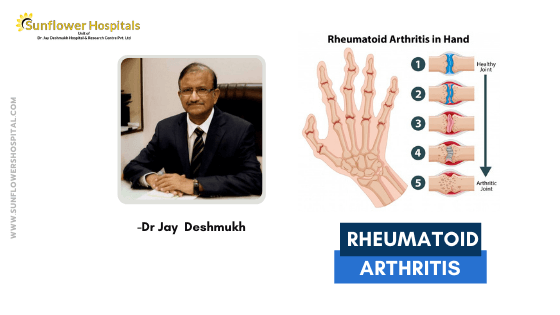Rheumatoid arthritis is a common medical disease that affects not only your joints but also the lungs, heart and blood vessels. It is more commonly observed in women than in men and can affect the small joints of the hands and feet, the wrists, knees, elbows and ankles. It is also known to involve the neck joints as well.
Is there a cure for Rheumatoid arthritis?
Presently scientists are yet to find a cure for Rheumatoid arthritis. You can only control the dis-ease and its symptoms. Some fortunate individuals can however have a mild form of the disease that can remain silent for intermit-tent times. The only way to mitigate the illness is to diagnose it early and treat it aggressively in the early stages. This would prevent joint deformities and ensure joint stability
What are the main symptoms of Rheumatoid arthritis?
Stiffness of the small joints of hands and feet, stiffness and swelling at the wrists and knees are the early symptoms. These symptoms generally occur on awakening early morning and are also increased at night. Exhaustion, fatigue, feeling feverish are com-mon accompaniments. Over a period of years, there would be joint swellings, thickening of the membranes covering the joints and deformities. In general, this ailment has genetic predisposition and females are more affected than men.
How to diagnose Rheumatoid arthritis?
The symptoms and distribution of joint pain are often typical. Blood tests like ESR and CRP often tell you the severity of inflammation. Rheumatoid factor and anti-CCP antibodies are often detected in blood samples of patients suffer-ing front Rheumatoid arthritis. Some individuals may require X-rays of involved joints and other radiographic modalities like MRI to assess the severity and also to confirm the diagnosis. At times a single joint may be involved, to begin with. Aspiration of joint fluid and its examination helps to differentiate it from other conditions.
Why some individuals have a mild form and some have joint deformities?
If the disease is not diagnosed early enough and treated appropriately and aggressively in the early phase, the chances of joint deformities are high. Changing medications too frequently, changing from Allopathic treatment to other forms of treatment and vice versa and taking treatment intermittently causes joint deformities. Many forms of therapies including herbal treatment, naturopathic treatment, acupuncture have not been proved to be beneficial in the long run.
What are the fundamentals of treatment?
This is a chronic incurable illness with intermittent worsening. Patience, discipline, family support and a positive outlook are required. Light exercises including Physiotherapy is essential to prevent muscle wasting and deformities. This also helps to prevent deformities. Pain-relieving drugs belonging to the NSAIDs class are important. Steroids in the tapering form are advisable. All these drugs have their own side effects and they need to be taken as per your doctor’s advice. Self-medication should be avoided. Additional supplements of calcium, vitamin D is advisable.
What are disease-modifying anti rheumatoid drugs?
Pain killers as such may not slow down the disease progression. DMARDs are known to slow down the disease. Hydroxychloroquine, Sulphasalazine, Methotrexate, Lefltmomide are important drugs belonging to this class. Certain agents are known as biological agents though expensive are also important in certain cases. All these drugs are known to have their own side effects and need to be taken under supervision. What about other precautions? Make sure that vaccines are administered against pneumonia and swine flu. Diabetes, hypertension and high cholesterol levels need to be addressed. Smoking should be avoided.
Is there a role for surgery?
Some patients are benefitted by total knee or hip replacement. Injection of steroids in joints and tendons, joint repair surgery, tendon transplant, syn. overtone are some of the many procedures in vogue. What are the key points in keeping the joints mobile, non-painitl and functional for many decades as rheumatoid arthritis has no cure? Early diagnosis and use of disease-modifying anti rheumatoid drugs, physiotherapy, analgesics and proper follow up with your physician on regular basis are suggested.
What about lungs and heart?
Interstitial lung disease, early atherosclerosis are seen in Rheumatoid arthritis patients. Incidence of cardiovascular disease and heart attacks are more common. Along with treatment to mitigate joint pains, treatment to prevent cardiovascular and respiratory diseases and their appropriate management is suggested. Newer modalities of treating rheumatoid arthritis have rekindled some hope in patients suffering from this chronic incurable dis-ease. Physiotherapy and exercises, medications, Orthopedician’s help and emotional support are necessary. Basically, the treatment and management is teamwork that includes the family members of the patient.


